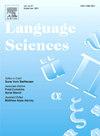从语用学的角度看汉语的表面邀请
IF 1.1
2区 文学
Q2 EDUCATION & EDUCATIONAL RESEARCH
引用次数: 0
摘要
在这项研究中,我们研究了汉语中的表面邀请,即互动者邀请收件人参加活动,但双方都知道这不是一个真实的邀请。为了识别虚假邀请和真实邀请之间的语用异同,我们比较了b微信上两个自然发生的在线交流语料库,包括70个虚假邀请和70个真实邀请。我们的分析表明,在我们的数据中,表面上的邀请往往是用公式化的表达来表示的,并以典型的仪式方式实现,邀请人通过这种方式来表达自己的善意。我们希望填补这一知识空白,因为以往的研究大多是研究汉语的表面拒绝,而不是表面邀请。我们也希望通过重新审视艾萨克斯和克拉克(1990)的开创性研究,为之前对表面邀请的研究做出贡献,该研究要么被用作研究非西方语言文化中表面邀请的出发点,要么因文化原因而被完全忽视。我们提出了一种介于这两种观点之间的中间立场,采用自下而上的方法来处理表面上的邀请,并使用一种结合仪式、表情、言语行为和互动的系统。本文章由计算机程序翻译,如有差异,请以英文原文为准。
Ostensible invitations in Chinese – A pragmatic perspective
In this study, we examine ostensible invitations in Chinese, i.e. cases where an interactant invites the addressee to an event when both participants are aware of the fact that the invitation is not a real one. In order to identify pragmatic similarities and differences between ostensible and genuine invitations, we compare two corpora of naturally-occurring online exchanges on WeChat, including 70 ostensible and 70 genuine invitations. Our analysis shows that ostensible invitations in our data tend to be indicated by formulaic expressions and realised in typically ritual ways through which the inviter displays her goodwill. We hope to fill a knowledge gap because previous studies have mostly investigated ostensible refusals of invitations in Chinese rather than ostensible invitations. We also hope to contribute to previous research on ostensible invitations, by revisiting the seminal study of Isaacs and Clark (1990), which has either been applied as a departure point for investigating ostensible invitations in non-Western linguacultures, or has been entirely dismissed on cultural grounds. We propose a middle ground between these views, by following a bottom-up approach to ostensible invitations and using a system which combines ritual, expressions, speech acts and interaction.
求助全文
通过发布文献求助,成功后即可免费获取论文全文。
去求助
来源期刊

Language Sciences
Multiple-
CiteScore
2.90
自引率
0.00%
发文量
38
期刊介绍:
Language Sciences is a forum for debate, conducted so as to be of interest to the widest possible audience, on conceptual and theoretical issues in the various branches of general linguistics. The journal is also concerned with bringing to linguists attention current thinking about language within disciplines other than linguistics itself; relevant contributions from anthropologists, philosophers, psychologists and sociologists, among others, will be warmly received. In addition, the Editor is particularly keen to encourage the submission of essays on topics in the history and philosophy of language studies, and review articles discussing the import of significant recent works on language and linguistics.
 求助内容:
求助内容: 应助结果提醒方式:
应助结果提醒方式:


